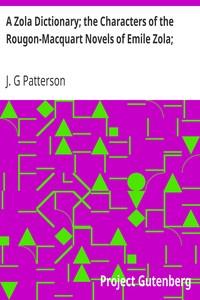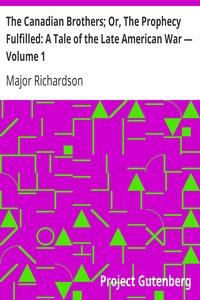|
|
Read this ebook for free! No credit card needed, absolutely nothing to pay.Words: 98210 in 33 pages
This is an ebook sharing website. You can read the uploaded ebooks for free here. No credit cards needed, nothing to pay. If you want to own a digital copy of the ebook, or want to read offline with your favorite ebook-reader, then you can choose to buy and download the ebook.

: A Zola Dictionary; the Characters of the Rougon-Macquart Novels of Emile Zola; by Patterson J G - Zola Émile 1840-1902. Rougon-Macquart Dictionaries; Zola Émile 1840-1902 Characters Dictionaries; Characters and characteristics in literature Dictionaries@FreeBooksTue 06 Jun, 2023 A ZOLA DICTIONARY The Characters Of The Rougon-Macquart Novels Of Emile Zola With a Biographical and Critical Introduction, Synopses of the Plots, Bibliographical Note, Map, Genealogy, etc. PREFATORY NOTE EDINBURGH, May, 1912. J. G. P. INTRODUCTION The first novel of the series was begun in 1869, but was not published till the winter of 1871, delay having occurred on account of the war with Germany. Zola was never a rapid writer, and seems to have regulated his literary production with machinelike uniformity. As his friend and biographer Paul Alexis writes: "Only four pages, but four pages every day, every day without exception, the action of the drop of water always falling on the same place, and in the end wearing out the hardest stone. It seems nothing, but in course of time chapters follow chapters, volumes follow upon volumes, and a whole life's work sprouts, multiplies its branches, extends its foliage like a lofty oak, destined to rise high into the air and to remain standing in the forest of human productions." On 29th September, 1902, the world was startled to learn that Emile Zola had been found dead in his bedroom, suffocated by the fumes of a stove, and that his wife had narrowly escaped dying with him. A life of incessant literary labour had been quenched. One must regret for his own sake that Zola was unable to avoid offending those prejudices which were so powerful in his time. The novelist who adopts the method of the surgeon finds it necessary to expose many painful sores, and is open to the taunt that he finds pleasure in the task. On no one did this personal obloquy fall more hardly than on Zola, and never with less reason. It may be that he accumulated unseemly details and risky situations too readily; but he was an earnest man with a definite aim in view, and had formulated for himself a system which he allowed to work itself out with relentless fatality. The unredeemed baseness and profligacy of the period with which he had to deal must also be borne in mind. As to his personal character, it has been fitly described by M. Anatole France, himself a distinguished novelist. Zola, said he, "had the candour and sincerity of great souls. He was profoundly moral. He has depicted vice with a rough and vigorous hand. His apparent pessimism ill conceals a real optimism, a persistent faith in the progress of intelligence and justice. In his romances, which are social studies, he attacks with vigorous hatred an idle, frivolous society, a base and noxious aristocracy. He combated social evil wherever he encountered it. His work is comparable only in greatness with that of Tolstoi. At the two extremities of European thought the lyre has raised two vast cities. Both are generous and pacific; but whereas Tolstoi's is the city of resignation, Zola's is the city of work." It is still too soon to form an opinion as to the permanent value of Zola's writings, for posterity has set aside many well-considered judgments; but their influence has been, and will continue to be, far reaching. They have opened up new avenues in literature, and have made possible to others much that was formerly unattainable. THE ROUGON-MACQUART GENEALOGICAL TREE. First Generation: Free books android app tbrJar TBR JAR Read Free books online gutenberg More posts by @FreeBooks
: The Tempting of Tavernake by Oppenheim E Phillips Edward Phillips - Detective and mystery stories@FreeBooksTue 06 Jun, 2023

: I Will Repay by Orczy Emmuska Orczy Baroness - France History Revolution 1789-1799 Fiction@FreeBooksTue 06 Jun, 2023
|
Terms of Use Stock Market News! © gutenberg.org.in2025 All Rights reserved.






